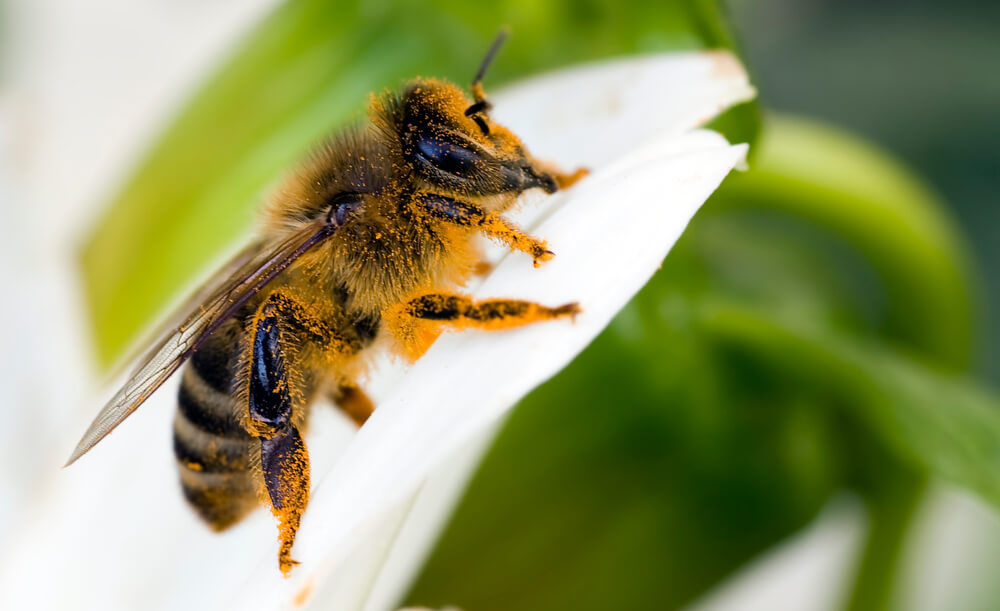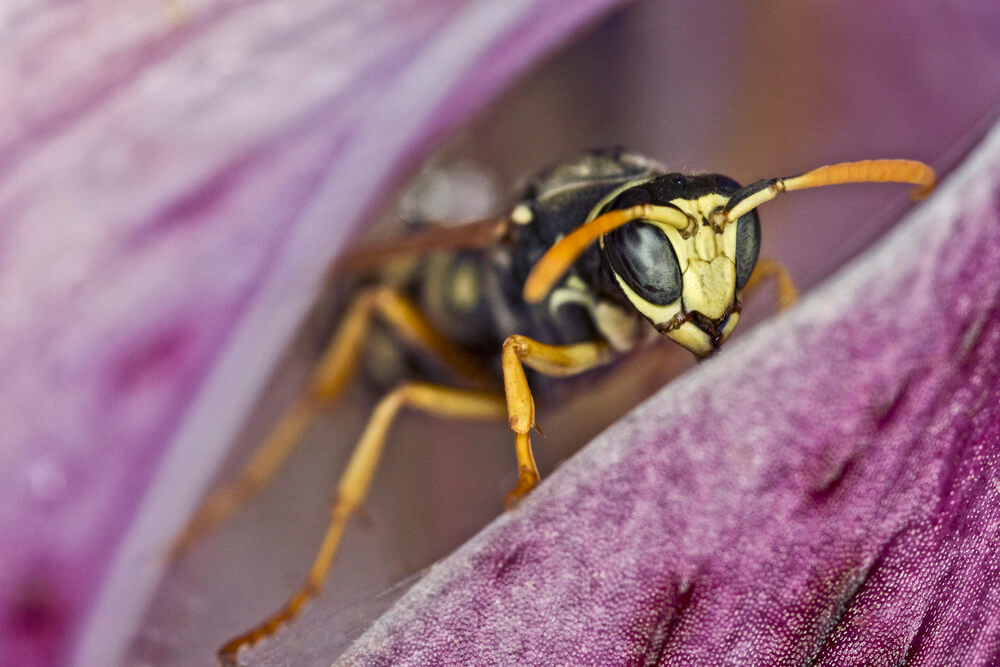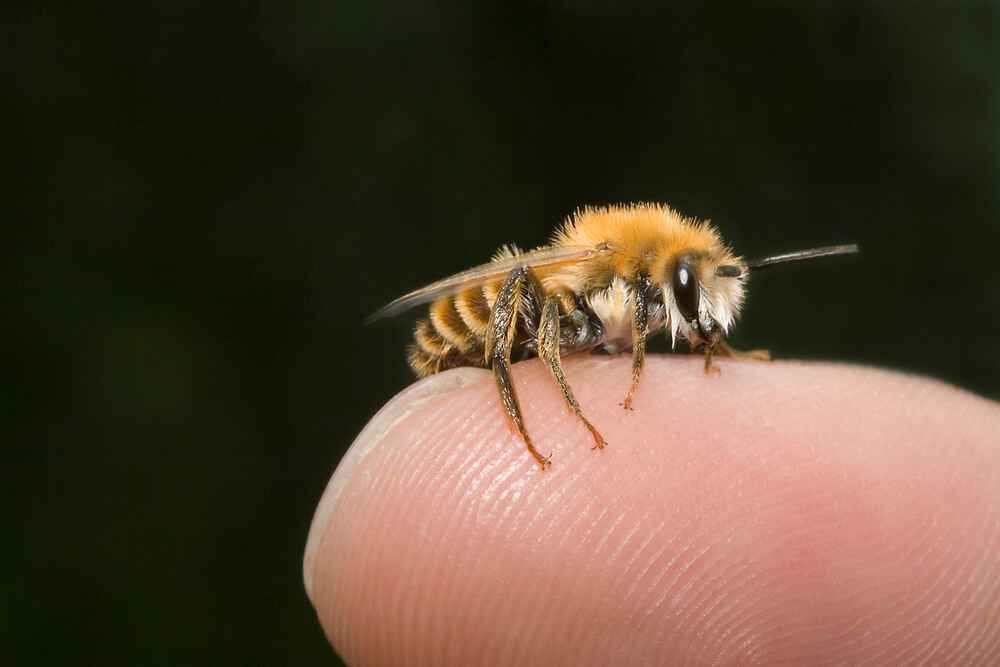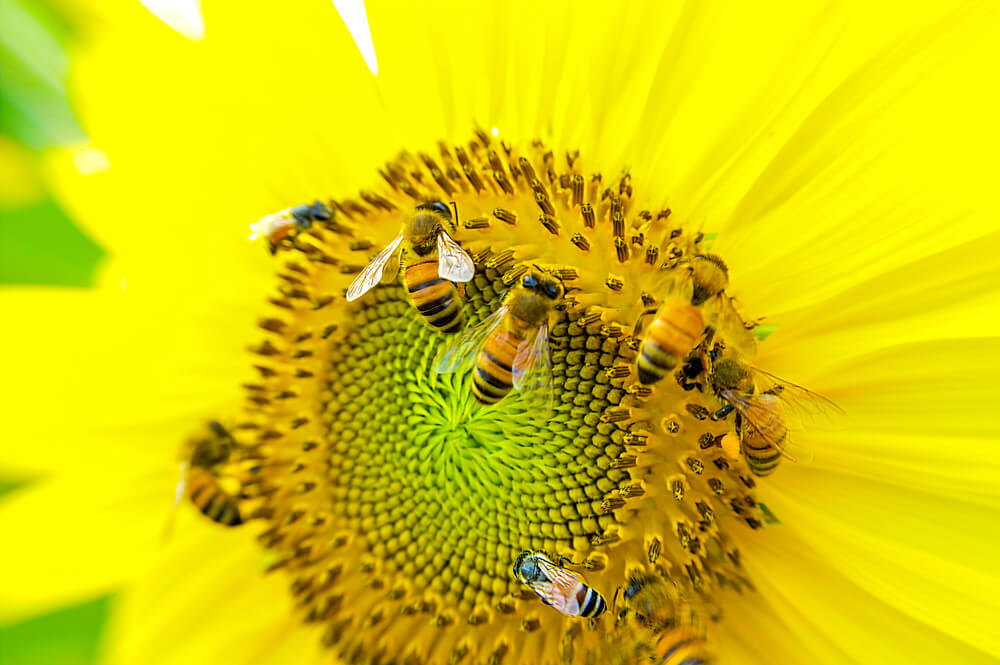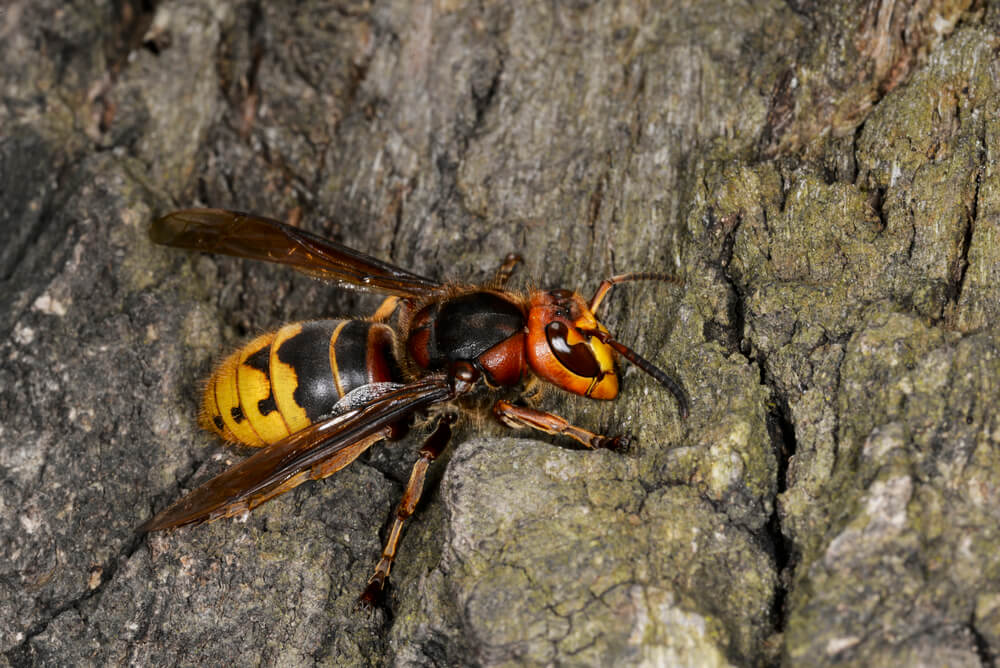Table of Contents:
How to Repel Bees Without Killing Them
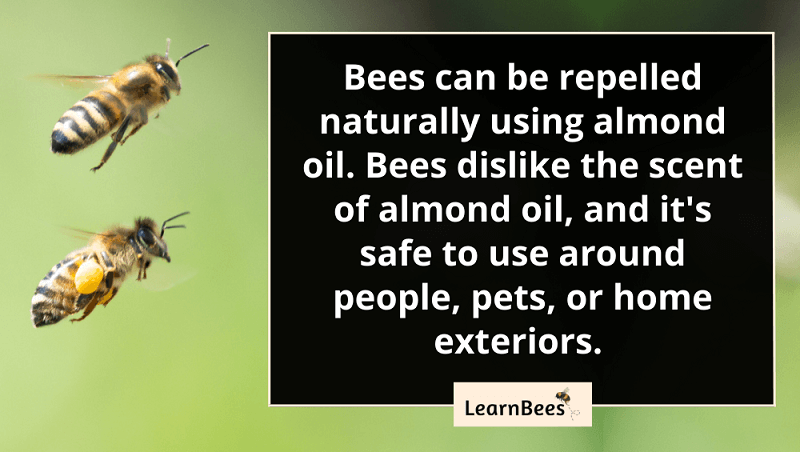
Almond oil is the best natural way to repel bees without killing them. Carpenter bees, bumble bees, and honey bees all dislike the scent of this oil.
Almond oil can be sprayed around your home’s exterior, including porches, decks, sheds, and foundations. Almond oil is also safe on wooden surfaces, making it an ideal no-damage, no-kill bee repellent.
More importantly?
Almond oil isn’t toxic to pets like some other types of oils.
With that in mind, the oil should not be diluted with other ingredients. Simply spray it directly around the area where you want to deter bees.
Now it’s worth noting:
Bees are attracted to flowers that provide them with nectar and pollen.
Unlike wasps, bees aren’t omnivores that eat other insects for food. Instead, bees are vegetarians that rely on pollen and nectar from flowers.
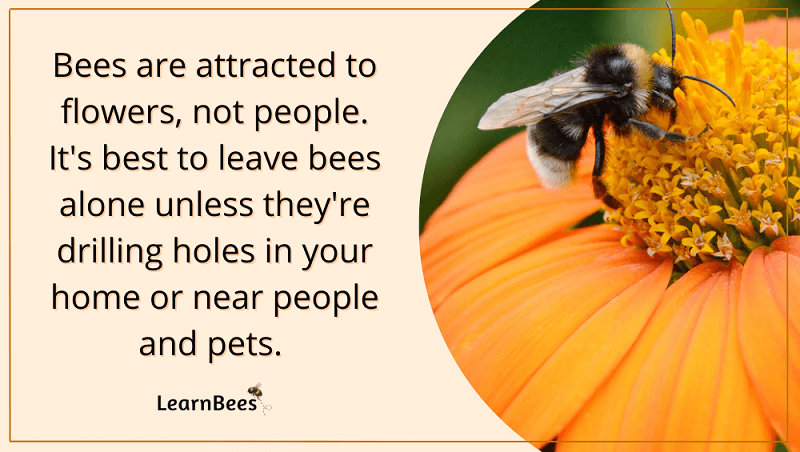
The good news is that bees tend to ignore people, flying from flower to flower until they zip back to their nest.
What does this mean?
This means there is no need to repel bees unless they’re causing problems.
For example, it’s understandable to deter carpenter bees because they drill holes into wooden structures around your home. It’s also understandable to deter bees from nesting near people, children, or pets.
But besides that?
Most bees will leave you alone if you leave them alone.
Just because they’re stinging insects doesn’t mean they’re out to get you. Bees usually reserve stinging for when they feel directly threatened, such as if you’re poking around their nest.
And not only that:
It’s important to remember what bees are attracted to first – not necessarily what deters them.
Bees need flowers to survive, so they’ll travel three or four miles in search of them.
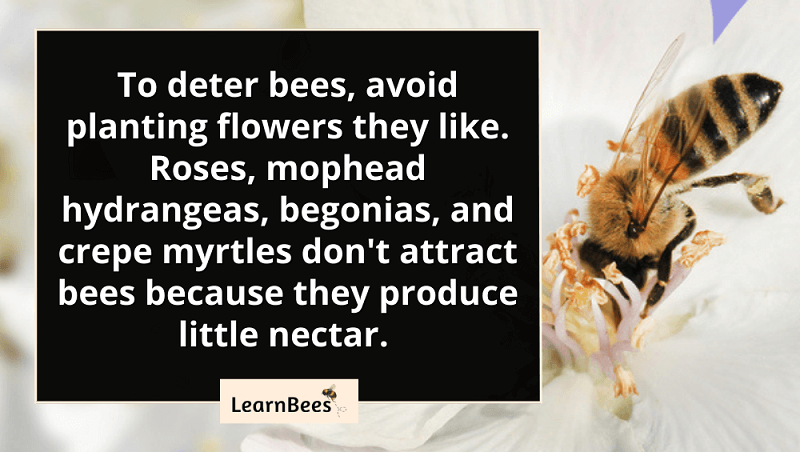
But not all flowers are equal in terms of food.
For example, you won’t attract bees if you plant things like roses, begonias, crepe myrtles, and mophead hydrangeas. Such flowers provide little to no nectar sources for bees.
And here’s the thing:
Some people recommend using certain scents like citronella oil, peppermint oil, lemongrass oil, and tea tree oil to repel bees.
These oils may be worth a shot. However, I’m skeptical of their effectiveness simply because many of these oils are what beekeepers use to bait and catch swarming bees.
Additionally, many of these oils are used in bee feed as a feeding stimulant.
So I’m skeptical of repelling bees with lemongrass oil, peppermint oil, oregano oil, and others. It’s not true that bees hate these scents. Quite the opposite, actually.
So, in summary:
I find that almond oil works best for deterring bees.
How Do I Repel Bees From My Swimming Pool?
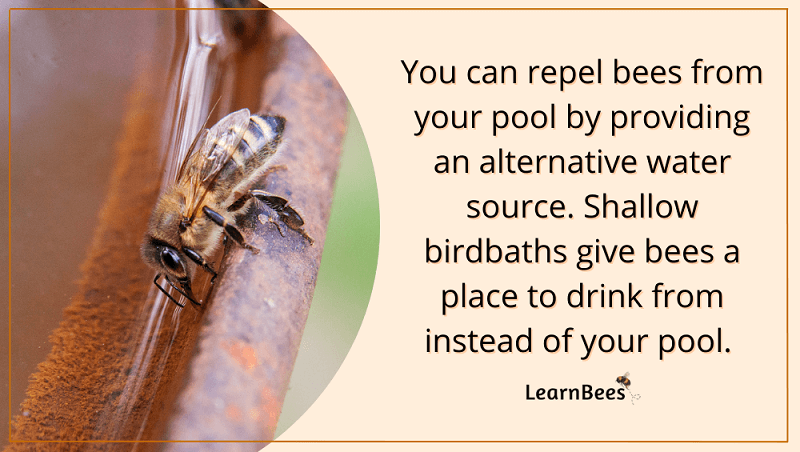
Bees will be deterred from swimming pools if provided an alternate place to drink water, such as a shallow birdbath.
But just one note:
Bees cannot swim.
As such, bees need landing perches like rocks, pebbles, or sticks to rest on while they drink. The bees will drown if they fall into the water and can’t get to safety within a few minutes.
This is why we recommend filling a shallow birdbath or bowl with rocks that come above water level.
And the good news?
Providing a water supply for bees requires little maintenance.
Bees like “dirty” water, so bee watering stations don’t have to be cleaned. Algae, moss, and earthy odors quickly attract thirsty bees. This is because a bee’s natural water sources come from mud puddles, pond edges, creeks, and damp rocks.
Bee waterers just need to be refilled regularly.
Now you might be asking:
Why are bees attracted to my pool?
Bees are attracted to both chlorine and saltwater pools because of the smell. The sodium, potassium, and magnesium found in pool water are important minerals bees need in their diets.
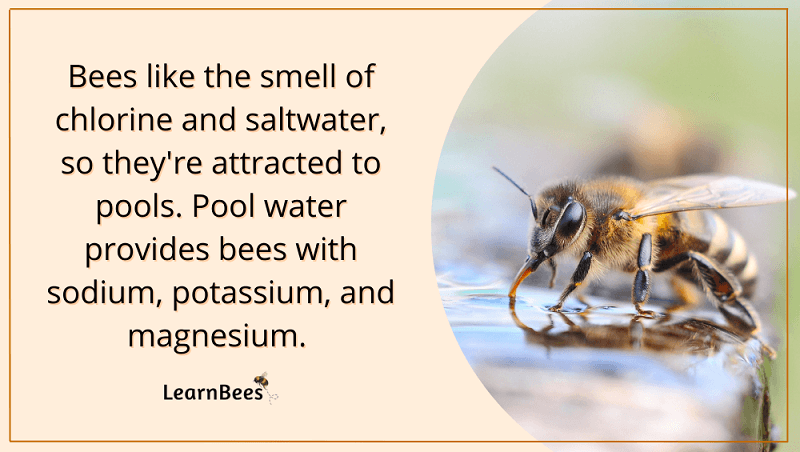
Now keep in mind:
You can contact a local beekeeper if you notice many honey bees around your pool. Beekeepers will often catch and relocate honey bee hives for free.
Better yet?
If you live next to a beekeeper and are experiencing bees around your pool, then contact your neighboring beekeeper and let them know what’s happening. They can resolve this issue by simply providing their bees with more water sources to drink from.
You can also use a bee repellent like almond oil around the pool area. But it’s important to make sure that the oil isn’t used in places where it could become a slipping hazard for people.
Last but not least:
You can also create a physical barrier by placing a cover or screening over your swimming pool to prevent bees from accessing the water. This is a great way to reduce the number of bees coming around.
FAQs On “How to Repel Bees Without Killing Them”
- Does citronella repel bees?
- Does Vicks Vapor Rub repel bees?
- Does soapy water repel bees?
- Will vinegar make bees go away?
- How do I deter bees from nesting?
- What is the best deterrent for bees?
- Will bees leave on their own?
- What home remedy gets rid of bees in the ground?
Does citronella repel bees?
Citronella oil has been used anecdotally to repel bees, but scientific research hasn’t backed this. Citronella is also believed to repel wasps, gnats, and mosquitoes.
With that said, recent evidence suggests that citronella doesn’t actually work as effectively as some people claim.(1)
One study tested 11 types of repellents on certain mosquitoes that can spread yellow fever, Zika, dengue, and other diseases.
To find the best options, scientists created a laboratory test that would simulate being on someone’s backyard patio. Scientists studied how many mosquitoes were attracted to a person depending on what repellent was used. They used five sprays, five wearable devices, and a citronella candle as repellents.
The results?
Most of the insect repellents didn’t live up to the promises on their labels.
The OFF! clip-on fan, containing the insecticide metofluthrin, was the only wearable device that worked. Most of the other products either had a weak repellent effect or were no better than if you hadn’t used any protection.
As such, citronella hasn’t proven effective in repelling bees and other insects.
With that said, you could try citronella to see if it works for you. Citronella oil or citronella candles are easily accessible and affordable.
—> Go back to the FAQs on “How to Repel Bees Without Killing Them”
More to Explore:
- How to Get Rid of a Bumble Bee
- What’s the Difference Between Wasps, Hornets, and Bees?
- Wasp Nest vs. Bee Nest: Which One Is It?
Does Vicks Vapor Rub repel bees?
Some personal accounts show people have successfully used Vicks Vapor Rub to repel bees. However, most of these accounts are from beekeepers who’ve used Vicks Vapor Rub to deter robbing bees and wasps.
Robbing behavior refers to bees and wasps that break into honey bee colonies to steal honey. This typically occurs during times of nectar shortage, such as summer droughts.
But:
The average person doesn’t own beehives and wouldn’t need to deter robbing bees. Also, Vicks Vapor Rub comes in small bottles, so it wouldn’t be practical to deter bees from a large area.
You can, however, try Vicks Vapor Rub on small areas where you want to deter bees or wasps – such as old nesting spots.
—> Go back to the FAQs on “How to Repel Bees Without Killing Them”
More to Explore:
- Wasps vs. Honey Bees: Are They Different?
- Are Worker Bees Male or Female?
- Queen Bee Versus Worker Bees – How Do They Compare?
Does soapy water repel bees?
Soapy water doesn’t repel bees, but it does kill them if it comes into contact with them.
That said, bees are valuable pollinators that shouldn’t be killed unless you’re a beekeeper dealing with a seriously diseased colony.
I strongly recommend calling a local beekeeper to handle stinging insects that need to be removed. Beekeepers can try to save honey bees by moving the colony to another location. If you have wasps, a wasp specialist may harvest them for their venom.
Most often, beekeepers will provide bee removal services for free.
—> Go back to the FAQs on “How to Repel Bees Without Killing Them”
More to Explore:
- What Are Black and Yellow Wasps?
- How Long Do Bumble Bees Live?
- Honeybees vs. Bumblebees: How Do They Compare?
Will vinegar make bees go away? What does white vinegar do to bees?
Vinegar doesn’t deter bees, nor does it kill them.
Some claim that vinegar kills bees because it’s acidic with a pH of 2 to 3. However, honey is also acidic, with an average pH of 3.9. And as you may have guessed, honey doesn’t kill bees due to its acidity. Some species of bees actually make honey.
Vinegar is no different. The acidity doesn’t harm bees or wasps.
Additionally, most people who try to use vinegar as a bee repellent end up diluting it with water. This further reduces the acidity of the vinegar, making it useless for killing bees.
—> Go back to the FAQs on “How to Repel Bees Without Killing Them”
More to Explore:
How do I deter bees from nesting?
It’s hard to deter bees from nesting if they like their spot. The best thing to do is contact a local beekeeper to relocate the nest. Or, better yet, give the bees their space and allow them to nest peacefully.
Bees aren’t the aggressive, confrontational insect some people think they are. Bees prefer to leave people alone and nest in peace. You should be fine in most cases if you give them space away from their nest.
—> Go back to the FAQs on “How to Repel Bees Without Killing Them”
More to Explore:
What is the best deterrent for bees?
This is a common question we get asked, along with other questions like:
How do you make bees go away? What natural thing keeps bees away? What smell do bees hate the most? How do you repel bees quickly? How do you force bees to leave? How do you keep bees away without getting stung? What can I spray to get rid of bees?
The best deterrent for bees is almond oil. The scent of almond oil is known to deter bees and other stinging insects. You can apply almond oil to the exterior of your home, such as decks, porches, or around porch eaves.
—> Go back to the FAQs on “How to Repel Bees Without Killing Them”
More to Explore:
Will bees leave on their own?
Most bee colonies will die off by the late fall, so you won’t have to worry about bees by the winter. However, bees may return to nest around your yard once spring hits.
If you have bees nesting in or around your home, it’s best to leave them alone. You can try using almond oil around your doors, porches, or other areas where bees are attracted to.
Also, contact a local beekeeper who can safely relocate the colony away from your home. Most beekeepers will relocate colonies for free because it allows them to catch bees they can keep.
—> Go back to the FAQs on “How to Repel Bees Without Killing Them”
More to Explore:
What home remedy gets rid of bees in the ground?
Ground bees are attracted to open areas of dirt where they can dig to make their nests. The best way to deter ground bees is to grow a thick, luscious lawn with very few dirt areas for them to dig into.
Also, using a sprinkler system to keep the ground wet will help deter ground bees because they prefer dry soil.
—> Go back to the FAQs on “How to Repel Bees Without Killing Them”
